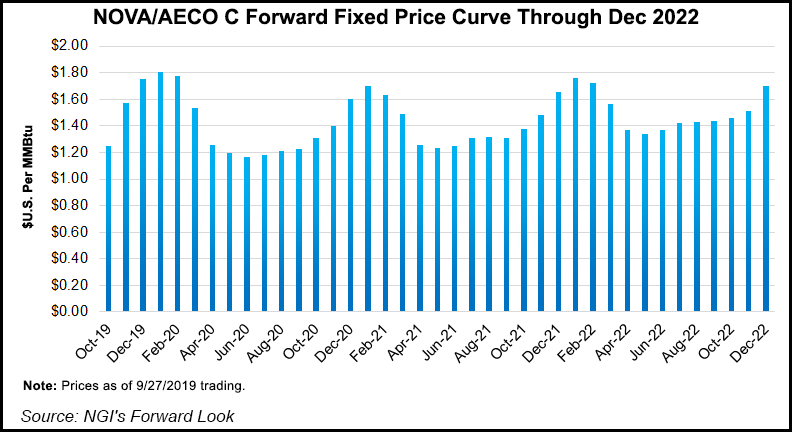Infrastructure | NGI All News Access | NGI The Weekly Gas Market Report
Western Canada Natural Gas Prices Seen Firming on NGTL Rate Change
Producers and buyers alike predicted that unstable Western Canadian natural gas prices will firm up following delivery rules changes approved Thursday for TC Energy Corp.’s supply collection grid in Alberta and British Columbia, Nova Gas Transmission Ltd. (NGTL).

The Canada Energy Regulator (CER) authorized NGTL to grant priority to shipments into storage when seasonal maintenance and construction interfere with the network’s capacity.
“This proposal will ultimately raise the average price of natural gas,” Dow Chemical Canada said in a flurry of regulatory activity that began when NGTL filed the tariff change proposal Aug. 26.
“Unfortunately, this support will come at the expense of every natural gas consumer — both within and outside of Alberta,” said Canadian Fertilizers Ltd.
The new pipeline traffic rule “will reduce the extreme volatility that currently exists” in gas prices, said Tourmaline Oil Corp., one of 22 producers that backed the NGTL change.
Peyto Exploration and Development Corp. agreed that the change “will restore the orderly management and maximization of capacity on the over-contracted NGTL system.”
The Alberta Reference Price (ARP), a monthly index compiled by the provincial government, registered the volatility of trading NGTL shipments as it has averaged only C$1.31/gigajoule (GJ) ($1.03/MMBtu) to date this year.
The newly approved NGTL tariff amendment is forecast to prevent repetitions of the ARP plunge to C55 cents (43 cents) when the 2019 summer pipeline work season and annual gas demand lull arrived in June.
As a gas royalty collector, the Alberta government supported the NGTL rule change as an antidote against market hard times, which were documented in a grim report by a cross-section of industry veterans.
In a description of pipeline conditions that led to the change the report said, “There is no systemic mechanism to ensure contracted receipt capacity matches delivery capacity — gas can enter the NGTL system and then ”get stuck’…
“Parties with delivery capacity exert market power in driving down the value of the stranded gas, which then ripples throughout field averages, reducing both producer cash flows and provincial royalties.”
The NGTL delivery rule change is scheduled to continue through the current pipeline maintenance period and the 2020 work season. Facilities additions are forecast to relieve pressure on the network as of 2021.
© 2024 Natural Gas Intelligence. All rights reserved.
ISSN © 1532-1231 | ISSN © 2577-9877 | ISSN © 1532-1266 |
